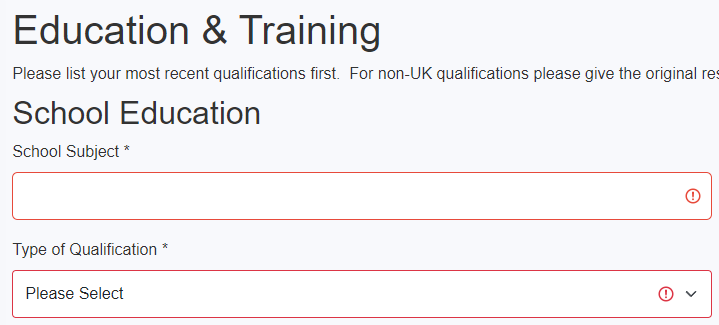In applying for a job, I’ve come to realise something is missing in online job applications. A machine readable CV format.
In the past you would write up a CV on 2 sheets of A4 at most. I remember doing this, it wasn’t even that long ago that it stopped being normal. The CV would list your most relevant job experience, qualifications, and other useful skills. But now I have come across so many networking, job recruitment, and HR application platforms that insist on getting all of your information, all of your history, and all of it entered via really annoying forms that sit over a hundred different pages.
It’s flipping1 annoying. It’s 2024. Data interop is the next big thing2. Why is there no single file format that can contain my employment history, my qualifications, my skills, in a single machine readable format. Ideally in a form that a human could easily scan if needed, and that one could store on a personal device.
No, I won’t make a LinkedIn or whatever profile. I won’t trust the formatting of my employment history to a siloed social media platform owned by Microsoft. And even if I did, a URL to a webpage is hardly a strictly typed and portable format any easier to read than a regular CV3.
Why must every single service demand I fill out the exact same information in a hundred different discrete form fields, each with their own formatting eccentricities?

Would XML or JSON be really so difficult to agree upon? I know we’ve kind of given up on the idea of a semantic web and having nicely typed everything, but surely storing this information once in a nice structured manner is better than forcing people to re-type it every time they want to share it with a new platform.
<CurriculumVitae>
<employment>
<employer>Dunder Mifflin</employer>
<start_date>Jan 1 2000</start_date>
...
<qualification>
<institution>Local Community College</institution>
<degree>National Certificate</degree>
...
What I would love is to have a single format of document, that existing services like LinkedIn or Indeed or Monster or whoever could export profiles as, or that you could use offline apps to craft. When you apply for a job, you select the most relevant entries, add a paragraph or so of flavour text tailored to the job, and upload. Rather than having to re-enter the same stuff on every single Oracle recruitment page.
Now that I think about it, where’s the LLMs in all this? I thought they were supposed to be helping automate busywork tasks like this? Why can’t I just submit my CV as a document and have the system automatically pull out the employment information? Then again considering they’re only just learning how to spell and count properly, maybe it’s for the best they’re not involved.
And really, what’s wrong with the classic CV? Are these obtuse forms and platforms really making it any easier for recruiters to find the right candidates4? For candidates to find the right jobs? Is that much time being saved versus just sharing a document full of easy to read, personally crafted, and neatly laid out words?
Anyone else have headaches about this? Please leave a comment.
@lonm I haven't seen the other side of those platforms yet, but from what I've read, these systems help the hiring staff quite a lot. The systems can auto-reject and prioritize job applications based on specific criteria. The hiring manager can search applicants by keywords and specifically select interesting ones. If you only upload your CV, chances are it'll be analyzed by some algorithms to get this data, and since this is very error-prone, I'd prefer to insert the data myself.
That’s a fair assessment. In that case, having some clearly defined structure for a CV would be more helpful in assisting interoperability and accessibility with these platforms.
@lonm certainly, but there's probably not much incentive on the employer's or hiring system developer's side. What's their return for sending out someone to negotiate a standard with competitors? The system works just fine for them. And I believe this isn't a big pain point for job seekers either, you usually search for a job once in a few years at most.